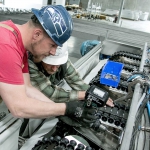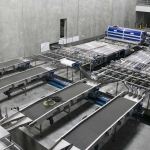The new cherry packing facility of Washington Fruit and Produce Company is nearly ready for the 2014 cherry season that starts in June. The new packing house will handle double the cherry volume in comparison to the company’s old plant.
Rick Plath, president of the Yakima, Washington-based grower-shipper business, told Good Fruit Grower there are several reasons why the company is investing in a new cherry packing house. The size of the investment was not disclosed.
“Cherry packing capacity in the Northwest is limited,” he said. “There’s not a lot of excess packing capacity, and during cherry season, plants are running at their peak, twenty-four/seven. We see opportunity for new plants even though cherries are a shorter season than apples.”
Another reason for the new facility relates to changes in cherry plantings that have occurred in the last decade. Cherries have followed apple industry trends of increased acreage, high-density orchards, and use of semidwarfing rootstock and scion combinations, he said.
“These modern rootstocks and varieties are more precocious than their grandfathers, and they’ve doubled production on the same acreage. Cherry production in the Northwest has not peaked by any means.”
Plath cited new technology in cherry packing as another reason for building a new facility. In recent years, he’s observed high-quality Chilean cherries being imported to U.S. markets.
“Chilean cherries have a 30-day boat ride from harvest to market, and yet they arrive in great shape,” he said, adding that the Chileans are doing a great job of delivering high-quality cherries. “New technology for our cherries combined with improved temperature control in the cold chain will help ensure that Northwest cherries arrive in high quality.”
River Road
The new 85,000-square-feet cherry packing facility was built north of Washington Fruit’s new apple packing plant on River Road in Yakima. The company’s old cherry facility in Yakima was sold.
“We identified what we wanted on the cherry packing line first, and then we designed the building around the line instead of around existing constraints,” said Tommy Hanses, a partner at Washington Fruit.
The line will use two 16-lane, electronic sorters to size fruit and sort for internal and external defects. Packing capacity will be 20 tons of fruit per hour, double the capacity of the old line.
Labor savings from the sorting technology will allow the company to handle double the volume with the same work force, Hanses said.
“The new technology is a huge step up for the industry through improved sizing accuracy and sorting of defects like cracks, soft cherries, and splits,” he said. The driving force for the new plant is to improve fruit quality. “We’ll have consistent sizing and cleaner fruit.”
Hanses also believes the new technology will allow them to sort rain-damaged fruit. “In the past, sorters could only pick out a certain amount of good fruit from the damaged fruit,” he said.
Lines had to be slowed way down and were maxed out on capacity. Often, there was little incentive for the grower to try to salvage the good fruit.
Plath added that the new plant will integrate improved temperature control throughout the cold chain, including handling and packing cherries, a factor that he believes is one of the reasons for the high-quality arrivals of Chilean cherries.
New packing technology handles cherries more gently than old packing equipment, through better conveyance systems, gentler bag filling, and more advanced cluster-cutting equipment.
“It all adds up to a more gentle ride for cherries,” he said, adding that the new soft touch will allow them to force-air cool cherries after packing, a step that should help prevent pitting. Research has shown that cold cherries are more susceptible to pitting.
The new packing facility will allow Washington Fruit enough capacity to pack fruit from orchards of its owners as well as custom pack for outside growers. •









Leave A Comment